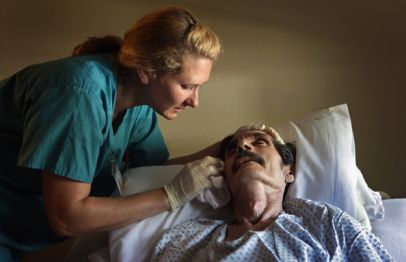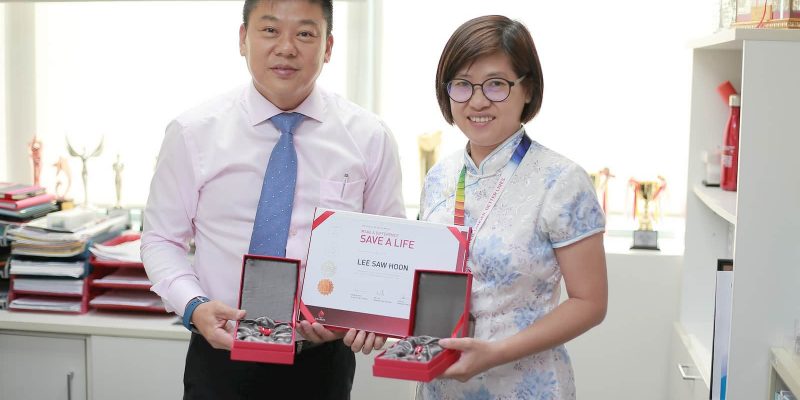Get to know all about terminal illness advice and support because proper care can make a big difference in the way they feel.
Contact Insurance Agent for Group Insurance
Contact our best insurance agent for a Malaysian plan for your company.

Click the button below to contact AIA Insurance Agent Levine Lee, to answer your questions on this insurance plan.
Or send in an enquiry. We will contact you to create the best insurance quotations to fit your employee benefits plan insurance needs.
Terminal Illness
Terminal illness is a term that is used to describe an illness related to a fatal disease that cannot be well treated and is expected to end in the death of the patient in a short period. Terminal illness includes a wide range of different illnesses and individual needs. Some of them may have a single disease or a number of conditions.
Someone who has a terminal illness will be described as a terminal patient or as being terminally ill. A patient who is not expected to live more than six months is called terminally ill. Medical conditions such as AIDS are not called terminal illnesses because the patient may live for many years before eventually dying of the illness.
When you’re the family member or friend of someone who receives a terminal diagnosis, life as you know it can change overnight. We asked people who have been through it themselves and sometimes on multiple occasions, to share their advice and support for navigating these difficult times.

What would you do to give them advice and support?
Hearing that your illness cannot be cured can be a frightening experience. Many people will be unable to take everything in. So, if they are going to be alone in the consultation, be there for them so they can be with a relative or friend in to hear everything the doctor has to say. This may involve asking for a follow-up appointment so you need to be prepared for it.
Not everyone wants to talk about what they are going through. However, a terminal diagnosis can bring up worries and fears, and it can help to talk about these so they don’t start to feel impossible to deal with.
Use actions to make their remaining days as easy and comfortable as possible. Be thoughtful about gestures that would be both practical and meaningful to them, and then see these things through. Prepare and deliver dinner, offer to clean the house, run errands or drive to doctor’s appointments. If you say you’re going to do something, follow through and do it. If you aren’t sure you will be able to deliver, it’s best not to make any commitments.
Why should you be with them?
Hearing that your illness cannot be cured can be a frightening experience. Many people will be unable to take everything in. So, if they are going to be alone in the consultation, be there for them so they can be with a relative or friend in to hear everything the doctor has to say. This may involve asking for a follow-up appointment so you need to be prepared for it.
Not everyone wants to talk about what they are going through. However, a terminal diagnosis can bring up worries and fears, and it can help to talk about these so they don’t start to feel impossible to deal with.

Medical care will be given to terminally ill patients to give them a better quality of life. Sometimes they go to a hospital to be looked after. The patient may also feel alone or isolated, even if there are family and friends around them. They might not even experience all of these feelings. The patient who had to suffer from terminal illnesses may be experiencing a range of emotions. It’s typical for them to feel or experience some or all of the following:
- shock
- fear
- anger
- denial
- sadness
- frustration
- relief
- acceptance
- resentment
- helplessness
Friends, family and health professionals
They might want to talk to you as a partner, family, or friend, or to a doctor, nurse, and a counsellor. People close to them will be dealing with their own feelings about the diagnosis. If someone who is in a terminal illness condition is finding it hard to talk about it, they might want to talk to someone less close to them, like a counsellor. The doctor or nurse can help you find one, or search for counselling services in your area.
How long will someone with a terminal illness live?
When a loved one experiences a serious illness, it is normal to experience the same emotional experience as sorrow. If the disease is life-threatening, it is important to talk about death and plan for the end of life. This conversation is difficult, but there is a way to make it easier.
People with cancer and their families often want to know how long a person is expected to live. The doctor won’t be able to give you an exact answer. Everyone is different and no one can say exactly how long the patient will live. But do ask if you feel like you need to. But of course, we can explain that we don’t expect them to be completely accurate, but that we just need to plan the time they have left.
The doctor might be able to give you an estimated time, based on how long other people with your type and stage of the disease have lived. Remember that the doctor’s answer is an estimate. The actual time could be shorter or longer than they say.
What kind of care will someone with a terminal illness need?
They are likely to be receiving treatment to help reduce or manage their symptoms, rather than cure their illness. They and their families may find they need different types of care, practical help or emotional support at various points throughout this stage of their illness.
If a life insurance policyholder also has terminal illness insurance, then they will have the benefit of knowing that if they’re diagnosed with a serious illness and is expected to die within 12 months of diagnosis, then the combined policy will pay out straight away rather than waiting for the policyholder to die.
Terminal Illness Advice and Support
The doctor will also know of any local sources of support. Ask the doctor to get an explanation of what has happened and ask what help that are available for the patient. This may include:
- Information services about the illness
- Financial benefits they may be entitled to
- Support groups and counselling

Get Financial Advice
Financial Security – It is There When Needed
Levine can help you to protect yourself and the future of your loved ones. Get immediate financial security. Don’t touch your savings. Let insurance provide it.
She can help provide financial security in times of hardship and will be able to ease the financial burden of your dependents in your absence.
Contact our AIA INSURANCE AGENT LEVINE LEE to get in touch with us and start your personal coverage, group coverage or choose your plan now. Get covered correctly. Be advised correctly. Call Levine Lee (+6012-684 0948) today to be advised on the best insurance protection personalized for you. Or send us the form below on your interest.

At Red Cover Life Planning, we emphasize our people- helping them grow, expanding their abilities, and discovering new opportunities. Join us now to be part of our team and story.








